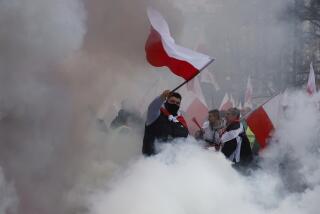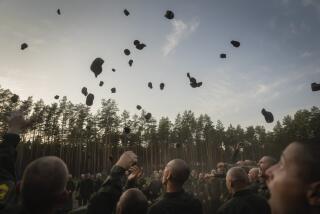Ukrainians see worrisome nationalistic elements among protesters
KIEV, Ukraine — The protest movement seeking to push Ukrainian President Viktor Yanukovich from power is providing a stage for what one analyst calls “wild protest factions” that are at times driving developments on the street and complicating efforts to negotiate a solution.
Members of one group don black masks and have combat experience fighting for Ukrainian nationalist or anti-Russian causes in several conflicts across the former Soviet Union. A leader denied the group is anti-Semitic, even while declaring that most Ukrainian bankers are Jewish. He added that there should be no room for gays in Ukraine.
Another group appears to lack clear goals, analysts said, but makes up for it with its ambitions and nose for scandal.
That second group, Common Cause, seized a Justice Ministry building in central Kiev, prompting the minister on Monday to say she would demand that the government declare a state of emergency to end weeks of unrest in the capital. Yanukovich met late into the night with opposition leaders in an effort to end the crisis, but there was no breakthrough.
Analysts said the difficulty of reaching a deal was compounded by the inability of the opposition to control the movement’s foot soldiers. Yanukovich wants to avoid bloodshed, said political scientist Kost Bondarenko, director of the Ukrainian Policy Institute, a Kiev-based think tank. “But the opposition leaders should help him to make the right choice by conducting negotiations with those ‘wild protest factions’ to keep them under control. This second task may prove to be quite harder than talking to Yanukovich.”
Opposition leaders distanced themselves from the seizure of the Justice Ministry building by members of Common Cause, who armed themselves with tree branches and military helmets. Late Monday, they persuaded the group’s members to leave the building.
Protesters captured the building late Saturday, not long after taking another strategically important building known as Ukrainian House. The latter building had been a temporary base for police forces attempting to put down the demonstrations.
The government has so far been unable to slow the momentum of the protests, which began two months ago in response to Yanukovich’s decision to turn down a trade deal with the European Union in favor of closer ties with Russia. Since then, the protests have widened to include calls to end government corruption and for Yanukovich to declare new elections for president and parliament.
One opposition lawmaker, former Deputy Interior Minister Gennady Moskal, claimed Monday that authorities were preparing a major operation against the protesters. About 10,000 policemen, special forces officers and border troops were being trained for the operation, Moskal wrote on Facebook.
The justice minister, Olena Lukash, said she would demand that Yanukovich declare a state of emergency, a move that would have to be ratified by parliament. Officials denied that was in the offing.
Vadim Karasyov, director of the Kiev-based Institute of Global Strategies, said the appearance of groups such as the nationalist UNA-UNSO hurt the opposition more than it helped. “Yanukovich and the people around him may say: ‘This is it. We need to protect society from these hoodlums and fascists, whom the opposition has no way of controlling. Hence a state of emergency and a civil confrontation.’ ”
Mikhail Borets, a 33-year-old computer engineer, said he was dismayed by the appearance of UNA-UNSO members on the streets Sunday during a funeral for a member the opposition claims was killed by a sniper. The government denied that accusation.
“We no longer see our students on the streets of Kiev, like in the first days of the protests — when my wife and I were there too,” Borets said. “Yesterday we were really scared when we saw all those paramilitary guys in masks and camouflage filing outside the cafe where we were, like in a Nazi parade with their red, white and black flags.”
“They were shouting, ‘Glory to the nation, death to enemies!’ and ‘Ukraine is above all!’ ” Borets said. “I don’t want it to be above all. This is not something this protest should have been about.”
The head of Kiev’s Jewish community, Alexander Levin, cited several attacks on Jews in the Ukrainian countryside and said that the ideology of some of the organizations involved in the protests meant that anti-Semitic attacks were possible.
Igor Mazur, a member of UNA-UNSO’s Political Council, said in an interview that his organization had about 400 men involved in the protest movement, including some with combat experience in places such as Chechnya and the Abkhazia region of Georgia. He said the group wanted to see Ukraine strong enough to dominate Eastern Europe, but that Jews had nothing to fear from it. He estimated that 90% of Ukraine’s bankers were Jewish, “but have you seen a single bank looted and pillaged?”
“Our problems are the criminal authoritarian regime of Yanukovich and the expansion of Russia, which wants to see Ukraine split,” he said. He also said in the interview that “there is no place for homosexuals in the country we want to build.”
Karasyov, the analyst, said Common Cause was a relatively new group of “foggy” origin. A spokesman for the group said government force was no match for the protesters.
“We will continue to seize ministry after ministry to block the government work,” Alexander Moiseyenko said in an interview inside the captured Justice Ministry building. “This is how state power is making a transition into the hands of the people.
“Yanukovich doesn’t have enough resources to oppose the revolution spreading like wildfire across the country,” he said. “We can take any ministry, any court, any agency in Kiev today and no one can prevent us.”
Special correspondent Victoria Butenko contributed to this report.
More to Read
Start your day right
Sign up for Essential California for news, features and recommendations from the L.A. Times and beyond in your inbox six days a week.
You may occasionally receive promotional content from the Los Angeles Times.






